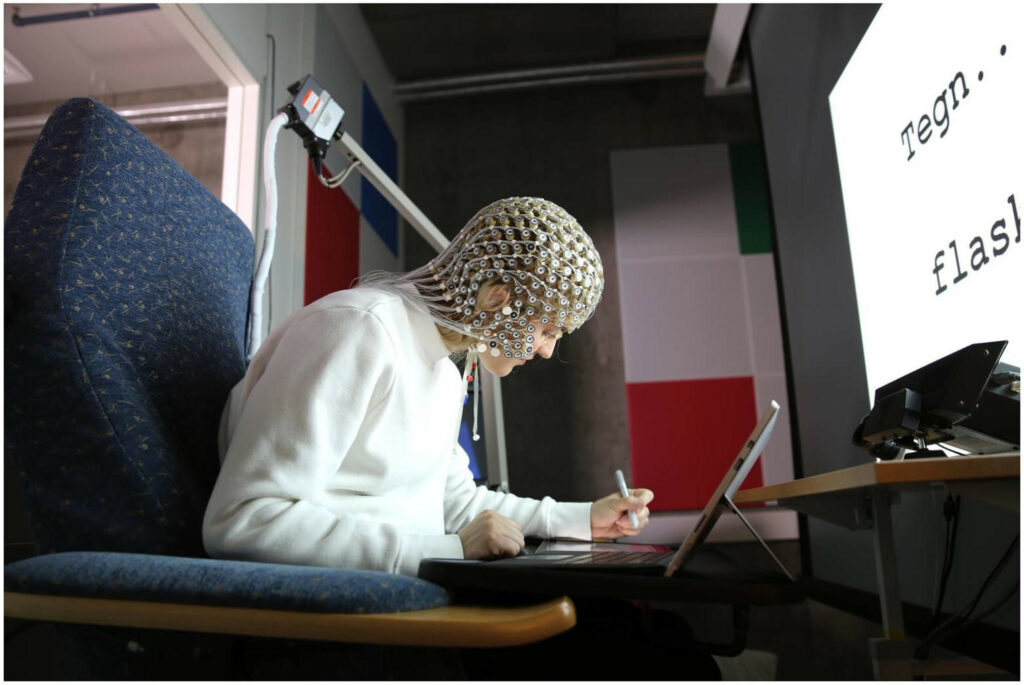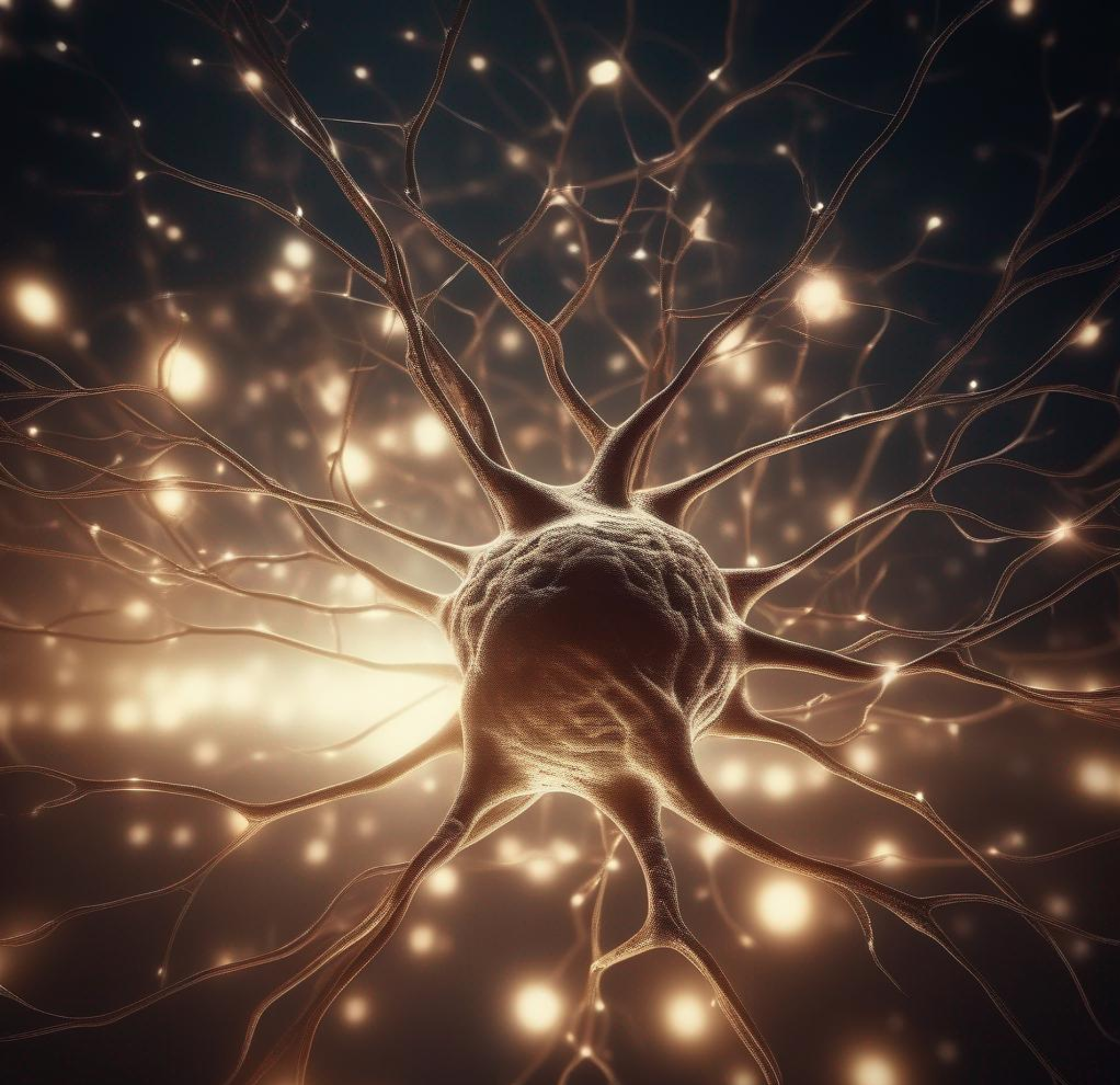
Experimental set-up with a participant wearing the Geodesic Sensor Net.
The humble act of journaling, a practice long esteemed for self-reflection and emotional release, can be further elevated through a curious phenomenon: the act of writing by hand. While the convenience of the keyboard is undeniable, scientific inquiry reveals that the pen, in its unassuming role, unlocks a treasure trove of cognitive and emotional benefits.
Firstly, consider the intricate dance between hand and mind that occurs during handwriting. This purposeful movement, unlike the swift keystrokes of typing, engages a complex network of motor functions and cognitive processes. This deeper engagement, as confirmed by various scientific studies, leads to superior memory recall and a more profound understanding of the information being expressed. Typing, while efficient, may not stimulate the same level of cognitive processing, potentially hindering the solidification of thoughts and experiences within the mind.
Furthermore, the act of handwriting transcends mere mechanics, venturing into the realm of the brain itself. Research has shown that the deliberate formation of letters on paper activates a wider network of brain regions compared to typing. This enhanced neural activity translates into a multitude of benefits, including improved problem-solving abilities, heightened creativity, and a strengthened capacity for memory formation. While typing undoubtedly engages the brain, the extent to which it activates these specific neural networks may be less pronounced.
The emotional landscape is also significantly affected by the choice between pen and keyboard. Handwriting, with its deliberate pace and physical connection to the act of expression, can serve as a powerful cathartic tool. Studies suggest that the act of physically putting pen to paper facilitates the release of negative emotions, fostering a sense of emotional release and potentially paving the way for a more positive outlook. While typing can also be used for expressive writing, the physical act of handwriting may provide a more tangible avenue for emotional processing.
Moreover, the benefits of handwriting extend to the realm of stress management and sleep quality. Gratitude journaling, a practice proven to alleviate stress, is particularly enhanced by the deliberate pace of handwriting. This slower, more mindful approach allows individuals to truly connect with their emotions and appreciate the positive aspects of their lives, fostering a sense of calm and well-being. While typing can also be used for gratitude journaling, the slower pace of handwriting may offer a distinct calming effect, further contributing to stress reduction. It is important to note that while journaling before bed has been linked to improved sleep, existing research does not differentiate between the effects of handwritten and typed journaling on sleep quality.
Finally, the accessibility and reflective nature of paper journals offer a distinct advantage over their digital counterparts. Unlike the ever-present distractions of the digital world, a paper journal sits patiently, readily available for whenever inspiration strikes. This inherent accessibility, coupled with the slower pace of handwriting, encourages deeper reflection and introspection, allowing individuals to truly delve into the nuances of their thoughts and experiences. While digital journals offer undeniable convenience, the act of typing might not encourage the same level of mindful reflection due to its inherent speed and potential for distractions.
However, let us not forget the curious evolution fueled by modern technology. For those inclined toward the digital realm, the stylus offers not merely a simulation, but rather an extension of the act of handwriting. When paired with a tablet, the stylus allows individuals to engage in the genuine act of handwriting within the digital world. The deliberate movements, the formation of letters, and the engagement of those intricate neural networks remain largely unchanged, unlocking the power of handwriting and preserving all of the cognitive and emotional benefits explored within this essay.
In conclusion, while both handwriting and typing offer valuable tools for journaling, the scientific evidence suggests that the pen, in its unassuming way, unlocks a treasure trove of cognitive and emotional benefits. From enhanced learning and memory to improved emotional processing and stress management, the act of handwriting imbues the practice of journaling with a unique depth and purpose. So, dear reader, if you seek to elevate your journaling experience and unlock the full potential of this enriching practice, we urge you to embark on a curious journey with pen in hand. You may be surprised by the profound impact this simple act can have on your mind, your emotions, and your overall well-being.
Summary
- Enhanced learning and memory: Handwriting engages more complex brain functions, leading to better recall and understanding compared to typing.
- Brain activation and deep processing: Handwriting activates wider brain regions, improving problem-solving, creativity, and memory formation, potentially to a greater extent than typing.
- Emotional processing and gratitude: Handwriting can be more cathartic, facilitating the release of negative emotions and fostering gratitude compared to typing.
- Stress reduction and sleep improvement: Gratitude journaling, especially when handwritten, may be more effective in managing stress and potentially improving sleep due to its slower pace and deeper reflection.
- Accessibility and reflection: Paper journals are readily available and encourage slower, more thoughtful writing, allowing for deeper reflection compared to the faster pace and potential distractions of digital journals.
- The power of the stylus: For those who prefer a digital touch, a stylus used with a tablet allows for genuine handwriting, offering all of the same cognitive and emotional benefits discussed, providing an alternative to traditional pen and paper.
Further Reading
- Exocerebrum (2024). Create Your Own Story: How Journaling Can Boost Your Happiness and Success. Exocerebrum.
- Rafizadeh, E., Morewitz, S., & Mukherjea, A. (2021). Handwritten Journals for Supporting Behavior Change. The International Journal of Health, Wellness and Society, 11(1), 143.
- Van der Meer, A. L., & van der Weel, F. R. (2017). Only three fingers write, but the whole brain works†: a high-density EEG study showing advantages of drawing over typing for learning. Frontiers in psychology, 706.
- Mueller, P. A., & Oppenheimer, D. M. (2014). The Pen Is Mightier Than the Keyboard: Advantages of Longhand Over Laptop Note Taking. Psychological Science, 25(6), 1159-1168.

One Reply to “A Journey into Enhanced Journaling: Beyond the Keyboard: the Hidden Powers of Pen and Paper”